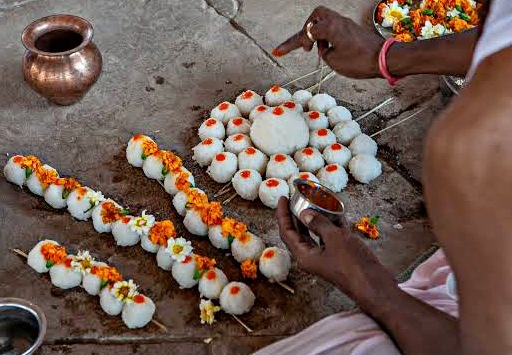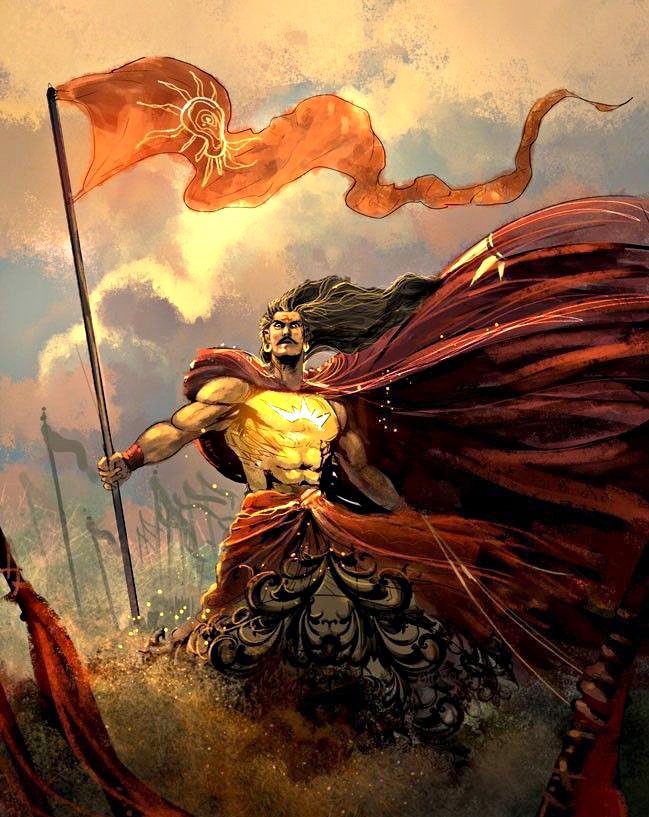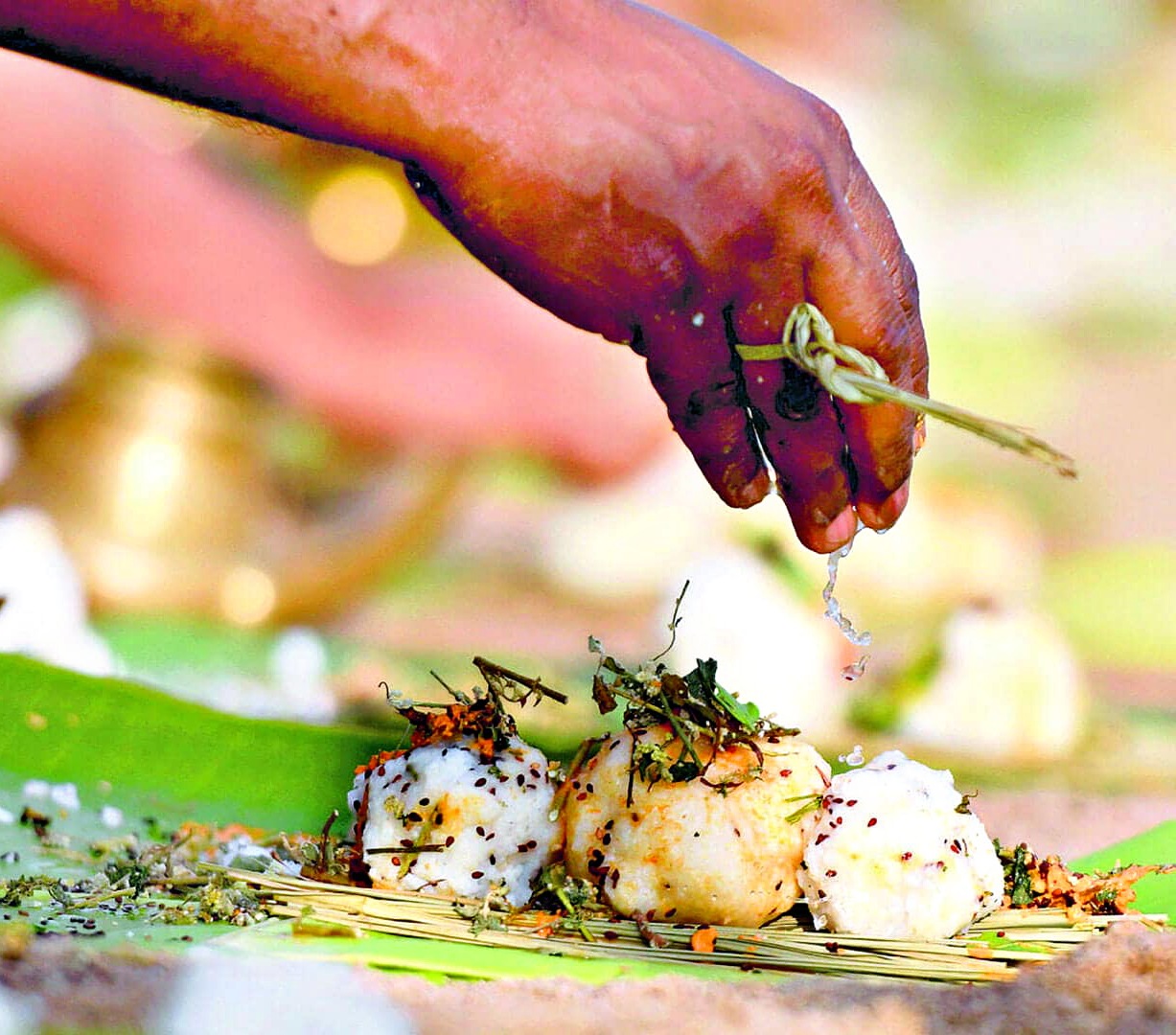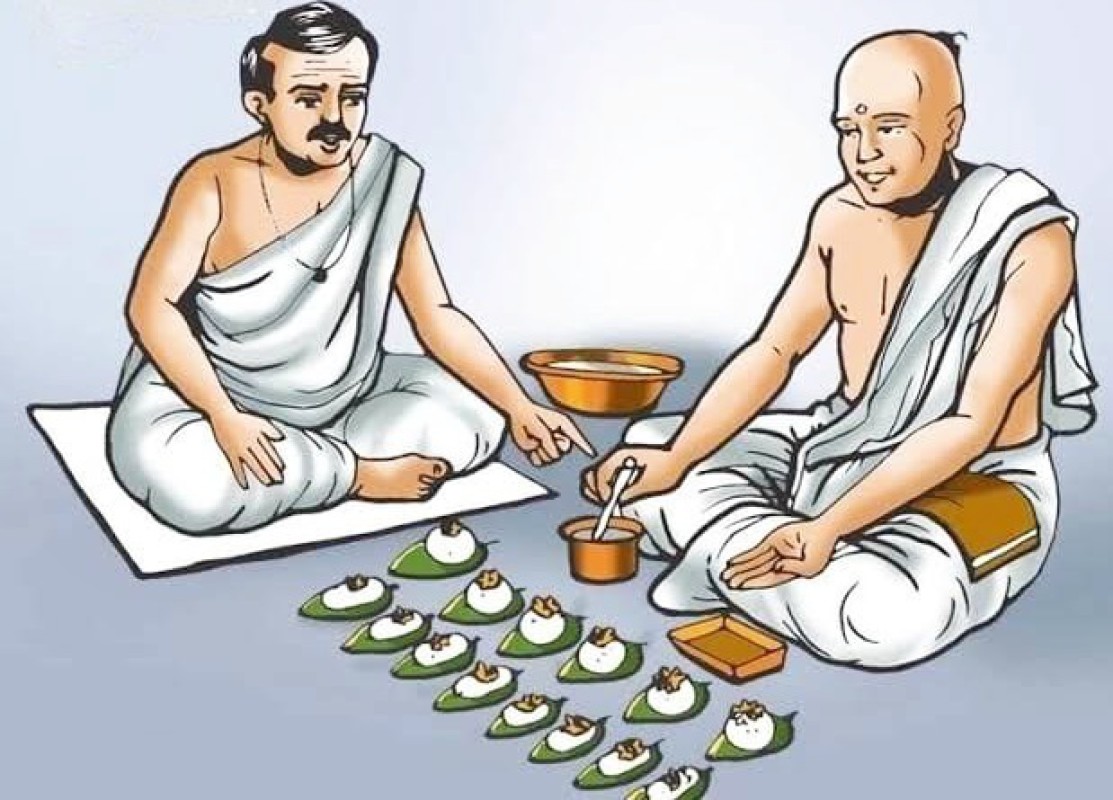Hindus believe in Sanatana Dharma – a lifestyle with prime importance for righteousness, values to respect every living being in the universe as well as those who left us. Sanatana means permanent/ eternal. Following the principles laid in Sanatana Dharma helps to uplift one’s life towards divinity. Culture & traditions as explained in Hindu scriptures makes us see godliness, not only in every living being in this universe, but also in those who left their body. One of the important traditions in Hinduism followed since ancient times is paying homage to our ancestors. Pitru Paksha (पितृ पक्षः) is one among such traditions followed by Hindus every year.
People express their heartfelt gratitude towards their ancestors who passed away in the lineage during these fifteen days of Pitru Paksha (पितृ पक्षः). Hindus remember their ancestors by offering prayers by way of rituals as per the scriptures during the Pitru Paksha (पितृ पक्षः). The 15-day period of Pitru Paksha mostly falls in the month of September. According to the Hindu calendar the fifteen days of dark fortnight of Bhadrapada month (भाद्रपदः) are known as Pitru Paksha (पितृ पक्षः). This occasion of Pitru paksha (पितृ पक्षः) is also a way of expressing heartfelt gratitude towards our lineage for everything our ancestors have helped in the life & for what we are now. The Scriptures suggest that, the departed soul (आत्मा) becomes satisfied & peaceful when these rituals are performed by their beloved ones. This helps the soul to burn bad karmas & get a body to reach the state of liberation (मोक्षः).
The Pitru Paksha (पितृ पक्षः) consists of two Sanskrit words Pitru (पितृ) & Paksha (पक्षः). The ancestors who are dead are known as Pitrus (पितृ) & Paksha (पक्षः) means fortnight. Together it means ancestral fortnight. Pitru Paksha (पितृ पक्षः) begins on the first day of the dark fortnight of the Bhadrapada month (भाद्रपदः कृष्णपक्षे प्रतिपदा) & ends on the no moon day of the Bhadrapada month (भाद्रपदः अमावास्या) which is known as Sarvapitru Amavasya. It is also known as Pitru Amavasya or Mahalaya Amavasya. These fifteen days of Pitru Paksha (पितृ पक्षः) are considered inauspicious by the Hindus as death rites are performed during this time. So, no new works or ventures or business activities or buying house, etc. are started during this period.

Significance of Pitru Paksha (पितृ पक्षः) -
According to the Astronomy (खगोलशास्त्रम्) & Astrology (ज्योतिश्शास्त्रम्), Pitru Paksha (पितृ पक्षः) is the time during which the sun crosses the equator & transitions overhead the southern hemisphere. As per Hindu traditions, the south celestial sphere is dedicated to the ancestors (पितृ). Hence, the moment when the Sun transits from the north to the south celestial sphere is considered to begin a day of the ancestors. This transition occurs during the dark fortnight of the Bhadrapada month (as per the amavasyanta tradition) & the dark fortnight of the Ashvina month (as per the purnimanta tradition). Hence this paksha has been designated as Pitru Paksha & Hindus perform special religious rites during this entire period.
According to the Dharmasindhu, at the beginning of Pitru Paksha, the sun enters the zodiac sign of Virgo (कन्या राशिः). And the souls of ancestors (पितृ) leave Pitru-Loka (Ancestral world) (पितृ लोकः) & reside in their descendants' homes for these fifteen days, until the sun enters the next zodiac sign Scorpio (वृश्चिक राशिः). Also, till the full moon day of the Bhadrapada month, which is the 15th day of the bright fortnight of the Bhadrapada month, it is the night of the ancestors & from the 1st day of the dark fortnight (भाद्रपदः कृष्णपक्षे प्रतिपदा) till the no moon day of the Bhadrapada month (भाद्रपदः अमावास्या), it is the day time for the ancestors. So, the souls which departed on the Poornima – full moon day, that departed one’s Shraddh is done on the 12th day or on the Sarvapitru Amavasya (सर्वपितृ अमावास्या).
During Pitru Paksha (पितृ पक्षः), the forefathers keep the hope that their sons & grandsons will satisfy them by providing Pinda Daan (पिण्डदानम्) (offering rice balls) & Tarpan (तर्पणम्) (presenting libations of water to the ancestors). With this hope, they come from Pitru Loka (पितृ लोकः) to Pruthvi Loka (Earth). Therefore, it is the duty of every Hindu householder that he must perform Shraddh & Tarpan for his ancestors during Pitru Paksha (पितृ पक्षः) & according to his financial condition, he should offer food, fruits & clothes to the needy or Brahmin for the sake of ancestors. Explaining the importance of offering Shraddha or Tarpan & worshipping the ancestors (पितृ) is stated in the Scriptures that;
आयुः पुत्रान् यशः स्वर्गं कीर्तिं पुष्टिं बलं श्रियम्।
पशून् सौख्यं धनं धान्यं प्राप्नुयात् पितृपूजनात्।।
Meaning – The one who worships the ancestors, achieves longevity, sons, grandchildren, fame, heaven, increase in strength, auspiciousness, animals, pleasures, wealth & grains.
आयुः प्रजां धनं वित्तं स्वर्गं मोक्षं सुखानि च।
प्रयच्छन्ति तथा राज्यं प्रीता नृणां पितामहाः।।
Meaning – Not only this, he gets all kinds of prosperity, good fortune, kingdom and salvation only by the grace of the ancestors.
Worshipping the ancestors (पितृ) is known as Shraddh karma. Shraddh is a tradition of performing rituals during Pitru Paksha (पितृ पक्षः). It symbolizes the act or the ritual which is performed with faith & sincerity with a noble cause in mind. The definitions of the Shraddh are stated in the Scriptures;
श्रद्धा प्रयोजनस्य इति श्राद्धम्।।
Meaning – Offerings offered to the ancestors with the faith is known as Shraddh.
According to the Dharmasindhu, the order of Shraddh & when to perform Shraddh of the departed souls are –
(1) Pratipada Shraddh – The one who died on the Pratipada Tithi, that person’s Shraddh is done on this day.
(2) Dwitiya Shraddh – The one who died on the Dwitiya Tithi, that person’s Shraddh is done on this day.
(3) Trutiya Shraddh – The one who died on the Trutiya Tithi, that person’s Shraddh is done on this day.
(4) Chaturthi Shraddh – The one who died on the Chaturthi Tithi, that person’s Shraddh is done on this day.
(5) Panchami Shraddh – The one who died on the Panchami Tithi, that person’s Shraddh is done on this day.
(6) Shashthi Shraddh – The one who died on the Shashthi Tithi, that person’s Shraddh is done on this day,
(7) Saptami Shraddh – The one who died on the Saptami Tithi, that person’s Shraddh is done on this day.
(8) Ashtami Shraddh – The one who died on the Ashtami Tithi, that person’s Shraddh is done on this day.
(9) Navami Shraddh – The one who died on the Navami Tithi as well as the married women’s Shraddh (i.e., whose husband is alive) is done on this day.
(10) Dashami Shraddh – The one who died on the Dashami Tithi, that person’s Shraddh is done on this day.
(11) Ekadashi Shraddh – The one who died on the Ekadashi Tithi, that person’s Shraddh is done on this day.
(12) Dwadashi Shraddh – The one who died on the Dwadashi Tithi & also sanyasi’s Shraddh is done on this day.
(13) Trayodashi Shraddh – The one who died on the Trayodashi Tithi, that person’s Shraddh is done on this day.
(14) Chaturdashi Shraddh – The one who died on the Chaturdashi Tithi, that person’s Shraddh is done on the Dwadashi (12th day) or on the no moon day (Amavasya) & any kind of accident or unnatural death like, the one who died due to weapon, accident, lightning strike or fallen tree – his Shraddh is done on this day.
(15) Amavasya Shraddh – The one who died on the Amavasya Tithi & about the ones who we do not remember the death Tithi or the forefather’s Shraadh is done on this day.
(16) Poornima Shraddh – The one who died on the Poornima i.e., full moon day, that person’s Shraddh is done on the Dwadashi (12th day) or Amavasya (no moon day).
It should be noted that, these dates are applicable only in Pitru Paksha (पितृ पक्षः). But the annual or a yearly Shraddha is called Samvatsari (संवत्सरी) i.e., the date on which the person has passed away- a yearly Shraddh. So, on that date the yearly Samvatsari Shraddha (संवत्सरी श्राद्धम्) should be performed & the Shraddha of Pitru Paksha (पितृ पक्षः) should also be performed.
Pitru Paksha (पितृ पक्षः) is also considered as a time to reflect on the principles of human birth. Hinduism gives high value for the bond that exists among all living beings. Pitru Paksha (पितृ पक्षः) is also the occasion to realise that our life is not just limited to the body. It also reminds about our connection with our loved ones transcending the physical realm. As per several Scriptures, the soul (आत्मा) is eternal & the human body is perishable. Similarly, the emotional connection between the living members & those who left the body continues. So, Hindus take this opportunity to express their love by being grateful for everything that has been passed on by our ancestors.
This offering during the pitru paksha (पितृ पक्षः) is considered as the dharma of those who continue to live in this world. It is beneficial for both who live & those who have passed away. Those who have passed away will get a push towards the higher realm in their journey towards liberation (मोक्षः).
Another benefit is we get closer to the forces of the universe that are beyond human vicinity & control. Offering of prayers will certainly benefit with good fortunes & auspiciousness. It also brings prosperity, happiness, good health, longevity, contentment & peace in the family.
Those people who do not perform Shraddh, Tarpan etc. for fifteen days during Pitru Paksha (पितृ पक्षः), they perform Shraddha for their ancestors on Amavasya – Sarvapitru Amavasya. On this day all the ancestors are immersed. During Pitru Paksha (पितृ पक्षः) the ancestors visit their own houses in the hope of Shraddh & if they do not get Shraddh then those ancestors go to their realm discontent & that discontentment of the ancestors which generates Pitru Dosha (पितृ दोषः) – a fault which is caused due to unsatisfactory ancestors.
Pitru Paksha (पितृ पक्षः) days are considered inauspicious so, buying a new house or vehicle or starting any new venture is strictly prohibited. Cutting nails & hair is also prohibited. Drinking alcohol & eating non-vegetarian food is strictly prohibited. It is advisable to eat only sattvic food, a food which is prepared, excluding onion & garlic during Pitru Paksha (पितृ पक्षः). Clicking pictures or videos of the puja ritual of Shraddha or any Pitru Paksha puja, is also strictly prohibited as, these pujas are considered to remove negativity & it brings inauspiciousness to the family who clicks pictures or videos of such puja.

Understanding the Debts (ऋणम्) in Hinduism –
The concept of Debts or Obligations (ऋणम्) & a feeling of gratitude was intelligently ingrained thousands of years ago in the Vedic system of life & further carried in the Hindu system of living. The universal value of gratitude has been insightfully woven in our social & religious aspects in the form of Debts or Obligations (ऋणम्) since it has a significant impact on the mental well-being of an individual & hence the society collectively.
The practice of simplicity for an enhanced sense of contentment & happiness is at the core of the Vedic system of Debts or Obligations (ऋणम्). It guides us to feel gratitude, not for material prosperity, but to be born in this world & having access to knowledge. The concept of Debts or Obligations (ऋणम्) suggests reverence for the basic. Debts or Obligations (ऋणम्) is a feeling of reverence for the essential & fundamental.
Taittriya Samhita mentions about three types of Debts or Obligations (ऋण) which are known as Ṛnatraya (ऋण त्रयम्) that every person owes & needs to repay in this life; (1) Deva Ṛn (देव ऋणम्) (2) Rushi Ṛn (ऋषि ऋणम्) & (3) Pitru Ṛn (पितृ ऋणम्).
(1) Deva Ṛn (देव ऋणम्) means a debt to the gods & goddesses. Gods & goddesses provided the whole ecosystem, gave birth to us & all the functions of the body, etc. so to repay the debts of gods & goddesses one must perform puja rituals & sacrificial rites (यज्ञः).
(2) Rishi Ṛn (ऋषि ऋणम्) means a debt to the Rushis. As the sages provided us the immense knowledge about our culture & religion, we are in debt of those sages who provided Vedas, Upanishads, Puranas, etc. To repay we should read, learn & understand our scriptures & share the same knowledge to others.
(3) Pitra Ṛn (पितृ ऋणम्) means a debt to the ancestors. Two significant message is inherent here - respect for the ancestors as we are because of them & importance of the basic needs (food & shelter) which are irreplaceable by the riches of the world. Human beings are in debt to the parents & ancestors, who bestowed lineage, a precious treasure of culture, traditions & Sanskara (संस्कारः). This debt is referred as Pitru Ṛn (पितृ ऋणम्).
We get a chance to repay this debt during Gruhasta Ashrama (गृहस्थ-आश्रमः) (living a householder’s life) by getting married & giving birth to a child & teaching them valuable traditions of the ancestral lineage. Offering Shraddha karma (श्राद्ध कर्मः) (a ceremony performed in the honour of dead relatives) & Tarpan (तर्पणम्) (presenting libations of water to the ancestors) to the ancestors during Pitru Paksha (पितृ पक्षः) also pays the Pitru Ṛn (पितृ ऋणम्) (ancestral debt).
Later Satapatha Brahman added two more Ṛn (Debts) to the list nroo or manushya Ṛn (नृ/ मनुष्य ऋणम्) – a debt to the mankind & bhoota Ṛn (भूत ऋणम्) – a debt to animals like cow, ox, etc., various plants & Panch Mahabhoot (पञ्च महाभूतानि) (five gross elements).
Likewise, these debts are paid off in our lifetime for the betterment & smooth lifestyle.

Historical account of Pitru Paksha (पितृ पक्षः) –
According to the Mahabharata, the first son of Kunti & Surya Deva was Karna. Kunti was granted the boon to bear a child with desired divine qualities from the gods & without much knowledge, Kunti invoked the sun god to confirm it if it was true indeed. Karna was secretly born to an unmarried Kunti in her teenage years, fearing outrage and backlash from society over her premarital pregnancy, Kunti had no choice but to abandon the newly born Karna adrift in a basket on the Ganges, in the hope that he finds foster parents. The basket discovered and Karna is adopted and raised by foster parents named Radha & Adhiratha Nandana of the charioteer & poet profession working for king Dhrutrashtra.
Karna was a renowned warrior. He was very kind & known for charity. He used to offer jewels, silver & gold to the Brahmins. He had an Armor of gold, which he offered to the Brahmin, because of which he died on the battlefield of Mahabharata. His soul went to heaven & was offered gold, silver & precious jewels, to which Karna asked Yama Deva (a God of Death) that he wish to have food & water, & not these precious jewels. To this, Yama Deva (a God of Death) replied to Karna that, he only donated gold & jewels to people all his life & never offered food & water in the name of his ancestors.
To this, Karna told Yama Deva (a God of Death) that, he didn’t know about his ancestors because he was blessed by Surya Deva (the God of light & day) to his mother & he has no clue of his ancestors. After this Yama Deva (a God of Death) instructed him about Shraddh Karma & offered him fifteen days to go back to the earth & rectify his mistake by offering food, fruits & clothes as a charity in the name of his ancestors & offering Shraddh & Tarpan to his ancestors. After Karna performed these rituals, he obtained food & water into the Heaven & also got Liberation (मोक्षः).
According to the Garuda Purana, Shraddh holds major significance in the first year of death. The soul starts traveling to Yamapuri (the world of Yama Deva) on the 14th day after death & reaches there in 17 days. They again travel for 11 months to reach the court of Yama Deva. Till the time the soul reaches the court, it has no access to food, water & clothes. The offerings of food, fruits, tarpan & Pind Daan (offering rice balls) (पिण्डदानम्) that is performed during Pitru paksha (पितृ पक्षः) reach these souls & satisfy their hunger & thirst & they are pleased with such deeds.

Ritual ceremony of Pitru Paksha (पितृ पक्षः) –
The male who performs the shraddh should take a purifying bath beforehand & is expected to wear a dhoti. He wears a ring of darbha/ kusha grass. Then the ancestors are invoked to reside in the ring. The shraddh is usually performed bare-chested, as the position of the sacred thread worn by the performer of the ritual needs to be changed multiple times during the ceremony.
The shraddh involves pind daan, which is an offering to the ancestors of pind (a ball which is made out of cooked rice mixed with ghee & black sesame seeds). Pind Daan (पिण्डदानम्) is a duty that every child needs to perform for his departed parents as, after performing the Pind Daan (पिण्डदानम्) our ancestors achieve moksha.
Pind Daan is followed with the release of water from the hand (तर्पणम्). Shraddha involves oblations to three preceding generations by reciting their names as well as to the lineage ancestor (gotra) (गोत्रम्). A person thus gets to know the names of six generations (three preceding generation, his own & two succeeding generations - his sons & grandsons) in his life, reaffirming lineage ties & by doing this, we offer peace & tranquillity to the forefathers.
Pind Daan is followed by the worship of Vishnu & Yama. The cooked food offering is then made, especially for the ceremony on the roof. The food includes rice, dal, sabji (vegetable curry), puri or roti & any sweet made up of milk.
The offering is considered to be accepted if a crow arrives & consumes the food. The bird is believed to be a messenger from Yama or the spirit of the ancestors. A cow & a dog are also fed, & later the Brahmin priests are also offered food. Once the crow, cow, dog & the Brahmins have eaten, the family members can begin lunch. The same ritual ceremony is done during the annual Samvatsari Shraddh (संवत्सरी श्राद्धम्). Let us understand what we acquire while feeding these during Pitru Paksha or annual Samvatsari Shraddh (संवत्सरी श्राद्धम्);
Feeding crow –
According to the Scriptures, the departed souls come in the avatar of crows on earth in search of food & water & feeding them is equivalent to feeding our ancestors. Yet another Scripture suggests that, the crows are messengers to Pitru Lok (पितृ लोकः) (the land of departed souls) & are associated with the air (वायुः) element one of the five elements.
Feeding ants –
Ants are also offered the food in shradh puja. An ant is considered the element Fire (अग्निः) & feeding sweet food to ants is an auspicious act & brings the blessings of our ancestors.
Feeding dogs –
The Scriptures suggest that, dogs guard the doors of heaven & hell. A dog is considered as the element of water (जलम्) & feeding a dog is an auspicious sign.
Feeding cows –
Cows have already been given a significant status in the Hindu religion & feeding them during shraddh is considered auspicious. A cow is associated with the element Earth (पृथ्वी) & as per the Scriptures, feeding cows during Pitru paksha (पितृ पक्षः) brings peace to the departed souls.
Feeding Brahmins –
It is believed that only after feeding the Brahmins, the ancestors accept the food & water, so if we miss this part then the puja is considered incomplete.
Thus, Pitru Paksha (पितृ पक्षः) is those fifteen days when we can repay our debts & obligations (ऋणम्) towards our ancestors (Pitru). This is not just a mythological ritual, i.e., the rituals which is merely based on our beliefs & that is why we prefer not to use the word Mythology in our articles. Pitru Paksha (पितृ पक्षः) is a time to reflect on the principles of human birth. Hinduism gives high value for the bond that exists among all living beings. Pitru Paksha (पितृ पक्षः) is the occasion to realise that, our life is not just limited to the body. It also reminds the connection with our loved ones transcending the physical realm. We should take this opportunity to express their love by being grateful for everything that has been passed on by our ancestors.
मार्गशीर्षः शुक्लपक्षे ५, २०७९
